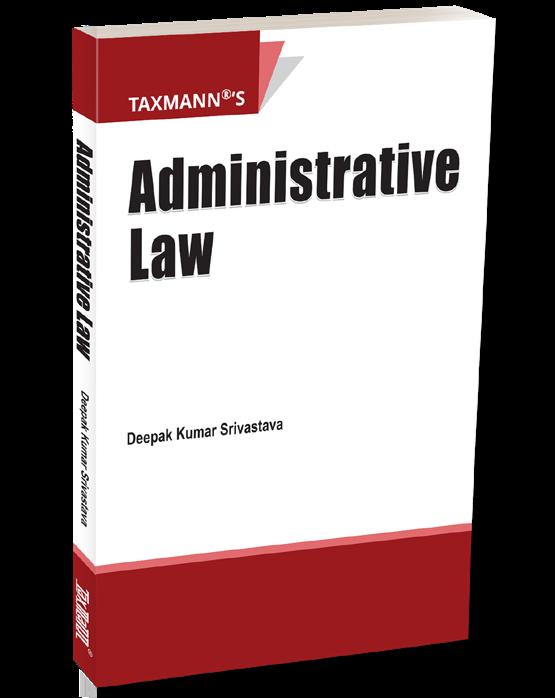













Administrative law, a vital branch of public law, is considered one of the most significant legal advancements of the 20th century. Over the years, administrative law has grown significantly, especially with expanding governmental functions in a modern welfare state. Administrative law in India has evolved, governing the relationship between the state and its citizens. It regulates the decision-making processes of various government administrative bodies, such as boards, tribunals, and commissions, which play a key role in formulating national policies on trade, taxation, transportation, and law enforcement. Due to the rapid expansion of administrative powers and responsibilities, administrative law has evolved into a distinct branch of constitutional law. It defines the structure, authority, and obligations of administrative agencies, highlighting its critical role as an independent legal discipline.
The Handbook of Administrative Law in India aims to provide a comprehensive yet accessible guide to the principles, doctrines, and judicial interpretations shaping this field. This book is designed to serve as a reference for students, legal practitioners, academicians, public administrators, and all those who seek a deeper understanding of the subject. It delves into fundamental concepts such as the rule of law, separation of powers, delegated legislation, principles of natural justice, administrative discretion, judicial review, and the role of tribunals in India. Additionally, it explores contemporary developments, including digital governance, public accountability mechanisms, and emerging challenges in administrative decision-making.
This handbook aims to present complex legal principles in a structured and reader-friendly manner, enriched with case laws, statutory provisions, and critical analyses. Special emphasis has been placed on landmark judgments of the foreign Courts, Supreme Court and High Courts of India, which have shaped the contours of administrative law.
I sincerely thank scholars, jurists, and policymakers whose contributions have influenced the study of administrative law. I also appreciate the support and encouragement from my peers, students, and colleagues who inspired me to complete this work.
I hope this book will serve as a valuable resource in understanding and applying the principles of administrative law in India. Constructive feedback from readers is always welcome and will help improve future editions. This book is dedicated to my mother, Late Smt. Meera Srivastava, who has always been a source of inspiration for me and remains so in my memories, and my father, Shri Jai Prakash Narain Srivastava, Advocate, Commissioner’s Court, Gorakhpur, from whom I have learnt dedication and commitment towards the work.
I am deeply grateful to several individuals who have supported me in completing this work, particularly Prof. (Dr.) V. C. Vivekanandan, Vice Chancellor, Hidayatullah National Law University, Raipur, as a source of inspiration, his dedication and work ethic have been genuinely inspiring, teaching me the importance of positivity and contentment. Mr. Aryan Khare, Assistant Professor at NLU Sonipat, and Ms. Shriya Badgaiyan, Ph.D. Research Scholarat HNLU. Ms. Shambhavi Tripathi and Ms. Palak Rajpal, Research Assistant, HNLU.
I also sincerely thank Punit Aggarwal, Deputy Editor and Content Acquisition Taxmann Publications Private Ltd. for his constant reminders and encouragement to complete the book on time.
Finally, I would like to express my heartfelt gratitude to my wife, Dr. Balwinder Kaur, Associate Professor, B. R. Ambedkar National Law University, Sonipat and my son, Harshit Narain, for their unwavering support in all my endeavours.


SYNOPSIS
4.1 Introduction
4.2 Background
4.3 Concept of natural justice
4.4 Indian constitution and natural justice
4.5 Natural justice and specific statutory provisions
4.6 Against whom natural justice may be enforced
4.7 Principles of natural justice
4.8 Post decisional hearing
4.9 Exceptions to the principles of natural justice
4.9.1 Doctrine of necessity and absolute necessity
4.9.2 Statutory exceptions to the rule of natural justice
4.9.3 Exception during situations of emergencies
4.9.4 Exception where no right of an individual has been infringed
4.9.5 Exception in cases where public interest is of importance
4.9.6 Exception in cases of impracticality
4.10 Criticisms of the principles of natural justice
4.10.1 Lack of clarity and precision
4.10.2 Inflexibility
4.10.3 Unrealistic expectations
4.10.4 Delays and costs
4.10.5 Limited applicability
Summary
Natural justice is the principle of universal application. It requires that person whose interests are to be affected by decisions, adjudicative and administrative, receive a fair and unbiased hearing before the decisions are made.1
The principles of natural justice form the cornerstone of a fair legal and administrative process. Rooted in the maxim that justice must not only be done but also seem to be done, these principles aim to ensure that decision-making processes are free from bias and afford individuals the opportunity to be heard. Derived from ancient Roman and Greek legal philosophies, natural justice emphasizes the importance of fairness, reasonableness, equity, and impartiality. It has evolved through common law and has become an essential element in legal systems around the world, including India, where it is closely linked to constitutional values such as equality before the law and the right to life and liberty. Despite their foundational role, the rules of natural justice are not rigid or absolute; their application depends on the context, statutory framework, and circumstances of each case.
“It is not merely of some importance but is of fundamental importance that justice should not only be done but should manifestly and undoubtedly be seen to be done.”
In R. v. Sussex Justices ex parte McCarthy, Lord Hewart C.J. 2 affirmed the basic principles of natural justice. The aphorism ‘Justice should be done’ is satisfied by merely observing the principles of natural justice. However, the principle does not end here. It extends further. Justice should manifestly be seen to be done. If this is ignored, then the decision will be affected, especially in cases where an allegation of bias or interest or favour is noticed and affording a proper hearing is not forthcoming from the decision.
Natural justice is the essence of fair adjudication, deeply rooted in tradition and conscience, to be ranked as fundamental. The purpose of following the principles of natural justice is the prevention of miscarriage of justice.3
The word ‘Natural Justice’ manifests justice according to one’s conscience. It is derived from the Roman concept of ‘jus-naturale’ and ‘Lex-naturale’ (Greek), which meant the principle of natural law, natural justice, eternal law, natural equity or good conscience. Lord Evershed, in Vionet v. Barrett4 remarked, “Natural Justice is the natural sense of what is right and wrong.” However, natural justice has meant different things to different people at different times. In its widest sense, it was formerly used as a synonym for natural law. Natural justice was considered as that part of natural law which relates to the administration of justice. Rules of natural justice are not embodied rules. Being means to an end and not an end in themselves, it is not possible to make an exhaustive
1. Ex Army Man Protection Services Pvt. Ltd. v. Union of India 2014 5 SCC 409
2. [1924] 1 KB 256
3. Suresh Chandra Nanhorya v. Rajendra Rajak (2006) 7 SCC 800
4. (1885 (55) LJRD 39)
catalogue of such rules.5 It has been used to mean that reasons must be given for decisions and that a body deciding an issue must only act on evidence of probative value. Rules of natural justice apply as much to proceedings in court of law as to proceedings before authorities elsewhere.6
In plain, ‘natural justice’ is the name given for the principles and procedures that govern the adjudication of disputes between persons or organizations, that the adjudication should be unbiased and given in good faith, and that each party should have equal access to the court/tribunal/authority and should be aware of arguments and documents adduced by the other.
In India, the principles of natural justice are the gift of common law. In the USA, the concept of natural justice is part of the ‘due process’ clause as enacted in the Fifth Amendment and Section- 1 of the Fourteenth Amendment of the Constitution. The fourfold principle of justice, viz., (i) notice, (ii) opportunity of hearing, (iii) an impartial tribunal, and (iv) an orderly course of procedure, is now, in the USA, a settled practice both in legal as well as administrative justice.7
The principle of natural justice is a fundamental concept in the administration of Law. Natural Justice implies fairness, reasonableness, equity, and equality. It is one of the most important rules and procedures in exercising justice and fair hearing. The principle of Natural Justice is also known as universal justice, fundamental justice, substantial justice, or fair play in action. In the words of A. L. Goodhart “Natural justice expresses the close relationship between the common law and moral principles and has an impressive ancestry”.8 Rudolf Von Jhering says that the success of the administration of justice is dependent on two requisite conditions: one is moral in its nature and a matter of character. The authority who decides the case must have the necessary firmness of will and moral courage to maintain the law without being led astray by consideration of any kind, by hate or friendship, sympathy, or fear, etc.9 The second requisite condition is the legal qualification of a judge or authority. Therefore, there is no guarantee of justice except the judge’s personality or authority.10 The Principles of Natural Justice are essential legal doctrines designed to uphold fairness, impartiality, and reasoned decision-making in both administrative and judicial
5. Swadeshi Cotton Mills v. Union of India (1981) 1 SCC 664
6. Diwakar Shrivastava v. State of Madhya Pradesh 1984 (Supp) SCC 214
7. Hari Sharan Saxena, Tribunals and Natural Justice Principles, Journal of the Indian Law Institute, July-September 1996, Vol. 38, No. 3 pp. 348-361
8. A.L. Goodhart, English Law and the Moral Law, 65
9. Viscount Bryce, Modern Democracies, vol. II. p. 3
10. Hari Sharan Saxena, Tribunals and Natural Justice Principles, Journal of the Indian Law Institute, July-September 1996, Vol. 38, No. 3 pp. 348-361
processes. These principles typically encompass two critical components: the ‘right to a fair hearing,’ which mandates that all parties involved have an opportunity to present their case and respond to evidence against them; and ‘the rule against bias,’ which ensures that decision-makers remain neutral and do not have a personal interest in the outcome. By adhering to these principles, legal systems aim to protect individual rights, promote transparency, and foster public confidence in the justice system, ultimately ensuring that decisions are made based on merit rather than prejudice or arbitrary judgment. By requiring due process in decision-making, they safeguard people from capricious actions and have their roots in common law, traditions and moral principles.
Rules of Natural Justice have developed with the growth of civilization and the content thereof is often considered as a proper measure of the level of civilisation and Rule of Law prevailing in the community.11. In order to protect himself against the excesses of organised power man has always appealed to someone beyond his own creation. Such someone could only be God and His laws could only be divine law or natural law to which all temporal laws and actions must conform. This is the origin of the concept of natural justice. However, natural justice is not the justice of the nature where the lion devours the lamb and the tiger feeds upon the antelope. Natural justice is of the “higher law of nature” or “natural law” where the lion and lamb lie down together and the tiger frisks with the antelope.12 Thus natural justice implies fairness, reasonableness, equity and equality. Natural justice is a concept of common law, and it is the common law world counterpart of the American “procedural due process”. Natural justice represents higher procedural principles developed by judges which every administrative agency must follow in taking any decision adversely affecting the rights of a private individual”.13
Principles of natural justice should neither be treated with absolute rigidity nor should they be imprisoned in a straitjacket. The concept of natural justice sometimes requires flexibility in the application of the rule. What is required to be seen is the ultimate weighing on the balance of fairness. The requirements of natural justice depend upon the circumstances of the case. Natural justice has many facets. Sometimes, the said doctrine applied in a broadways, sometimes in a limited or narrow manner.14
The concept of fairness is not a one-way street. The principles of natural justice are not intended to operate as roadblocks to obstruct statutory inquiries. Duty to adequate disclosure only an additional procedural safeguard in order to ensure the attainment of the fairness and it has its own limitations. The extent of its applicability depends upon the statutory framework.15
11. K.I. Shephard v. Union of India (1987) 4 SCC 431
12. Union of India v. Tulsiram Patel (1985) 3 SCC 398
13. K.I. Shephard v. Union of India (1987) 4 SCC 431
14. Arcot Textile Mills Limited v. Regional Provident Fund Commissioner (2013) 16 SCC 1
15. Natwar Singh v. Director of enforcement 2010 13 SCC 255
Natural justice is a concept which has succeeded in keeping the arbitrary action within limits and preserving the rule of law. But with all the religious rigidity with which it should be observed, since it is ultimately weighed in balance of fairness, The courts have been circumspect in extending it to situations where it would cause more injustice than justice. Even though the procedure of affording hearing is an important as decision on merits yet emergency of the matter, or public interest at times required flexibility in application of the rule as the circumstances of the case and the nature of the matter required to be dealt may serve interest of justice better by denying opportunity of hearing and permitting the person concerned to challenge the order itself on merits not for lack of hearing to establish bona fide or innocence but for being otherwise arbitrary or against rules.16
Rules of natural justice are not rigid rules, they are flexible, and their application depends upon the setting and the background of statutory provision, nature of the right which may be affected and the consequences which may entail, its application depends upon the fact and circumstances of each case. These principles do not apply to all cases and situations.17
The expression ‘Natural Justice’ is not used in the Constitution of India. Principles of natural justice constitute grounds for judicial review by courts, but they are also invoked by the Indian legislature in statutes as substantive administrative procedures. Although these principles derive from common law, modern Indian jurisprudence has attempted to root them within the Indian Constitution. Natural justice is the principle of universal application. It requires that persons whose interests are to be affected by decisions, adjudicative and administrative, receive a fair and unbiased hearing before the decision are made. The principle is traceable to the fundamental rights under Part III of the Constitution of India.18 Although rules of natural justice are not embodied rules nor can they be elevated to the position of fundamental rights.19
The preamble of the constitution includes the words, ‘Justice Social, Economic and political’ liberty of thought, expression, belief and worship, and equality of status and opportunity, which not only ensures fairness in social and economic activities of the people but also acts as a shield to individuals liberty against the arbitrary action which is the basis for the principle of Natural Justice. Apart from the preamble, Article 14 ensures equality before the law and equal protection of the law for the citizens of India. The principles of natural justice are not the creation of article 14. Article 14 is not their begetter but their constitutional
16. Karnataka Public Service Commission v. B.M. Vijaya Shankar (1992) 2 SCC 206
17. R. S. Dass v. Union of India 1986 (Supp) SCC 617
18. Kurian Joseph J. in Ex Armymen’s Protection Service Pvt. Ltd. v. Union of India (2014) 5 SCC 409
19. Union of India v. Col. J. N. Sinha (1970) 2 SCC 458
guardian. Principles of natural justice trace their ancestry to ancient civilization and sanctuaries long past. Until about two centuries ago the term natural justice was often used interchangeably with natural law and at times it is still so used.20
Where non-observance of principles of natural justice on the ground that the person concerned need not be heard as he has no defence or that the grounds against him are obvious, is on its face violation of principles of natural justice. Whenever principles of natural justice are violated, such an action is potentially and inherently violative of Article 14 of the constitution of India.21
Article 14 strikes at the root of arbitrariness, and Article 21 guarantees the right to life and liberty, which is the fundamental provision to protect liberty and ensure life with dignity; Article 22 guarantees natural justice and the provision of a fair hearing to the arrested person. Directive Principles of State Policy, especially Article 39A, take care of the social, economic, and politically backward sections of people and to accomplish this object i.e., this part ensures free legal aid to indigent or disabled persons, and Article 311 of the constitution ensures constitutional protection to civil servants. Furthermore, Articles 32, 226, and 136 provide constitutional remedies in cases where there is a violation of any fundamental rights, including principles of natural justice.
The Indian judiciary has also played a pivotal role in integrating the principles of natural justice into constitutional jurisprudence. Through various landmark judgments, the Supreme Court has rendered that even in the absence of explicit constitutional provisions, the principles of natural justice are inherent in the guarantee of equality and personal liberty. In the case of Maneka Gandhi v. Union of India22, the Court held that the procedure established by law must be ‘right, just, and fair’ and not ‘arbitrary, fanciful, or oppressive,’ thereby reinforcing the application of natural justice. The Court has always emphasized the importance of natural justice. In the case of the Corporate Manager v. Beena Hilkushi and Ors.23, the court said, “Principles of natural justice is not an empty formality.”
In case of B.A. Linga Reddy v. Karnataka State Transport Authority24, J. Arun Mishra commented that the rule of reason is the antithesis to arbitrariness in action and is a necessary concomitant of the principles of natural justice. If a statutory or public authority/functionary does not record the reasons, its decision would be rendered arbitrary, unfair, unjust and violating Articles 14 and 21 of the Constitution.
Generally, no specific provision is found in any statute which requires the principles of natural justice to be followed by the adjudicating authorities. It has
20. Union of India v. Tulshiram Patel (1985) 3 SCC 398
21. S.L Kapoor v. Jagmohan (1980) 4 SCC 379
22. AIR 1978 SC 597
23. 2023 Live Law (Ker) 686
24. (2015) 4 SCC 515
been settled by the court that even when the legislation is silent on the question of notice and hearing, the court will apply this rule as a universal application founded on the playlist principles of natural justice.
The above principle is accepted in India. It is well settled that where the exercise of power results in civil consequences, unless the statute rules explicitly out, the principle of natural justice will apply.25
In the case of A. K. Kraipak v. Union of India25a. Hedge J. propounded that “rules of natural justice aim to secure justice or, to put it negatively, to prevent miscarriage of justice.” These rules can operate only in areas not covered by any law validly made. In other words, they do not supplant the law of the land but supplement it.
The rules of natural justice have limitations. The party concerned cannot always enjoy the advantage of procedural prescriptions under the rules of natural justice, whether fair or not. The rules of natural justice being founded on principles of fairness can be available only to a party which has itself been fair, and therefore, deserves to be treated fairly.26
The principles of natural justice are binding on all the courts, judicial bodies, and quasi-judicial authorities. But whether these principles are also applicable to administrative authorities. Earlier quotes had taken the view that the principle of natural justice were inapplicable to administrative orders. In Franklin v. Minister of Town and Country Planning26a , Lord Tanker Tone observed that as the duty imposed on the minister was merely administrative and not judicial or quasi-judicial, the only question was whether the minister had complied with the direction or not. In the words of Chagla J. it would be erroneous to import into the consideration of an administrative order the principles of natural justice.
Earlier, the view of courts relating to the non-applicability of principles of natural justice to administrative orders has been overruled in Sahara India v. CIT, the Supreme Court retaliated that with the growth of administrative law, the old distinction between judicial act and administrative act has withered away. Today, even a pure administrative action involving civil consequences must be consistent with the rules of natural justice.
In case of Mohinder Singh Gill v. Chief Election Commissioner, 27 V.R. Krishna Iyer J. was of the view that normally natural justice involves the irritating inconvenience for men in authority, of having to hear both sides since notice and opportunity are its very marrow. And this principle is so integral to good government, the onus is on him urges exclusive to make out why.
25. Automotive Tyre Manufacturers Association v. Designated Authority (2011) 2 SCC 258
25a. AIR 1970 SC 150
26. Sahara India Real Estate Corporation Limited v. SEBI (2013) 1 SCC 1
26a. (1948) AC 87 (HL)
27. (1978) 1 SCC 405
Natural justice consists of certain principles which are essential to justice. If these essential principles are overlooked, the result would be a travesty of justice. It is a great humanising principle intended to invest in law with fairness and to secure justice. In modern jurisprudence, natural justice includes the following three procedural safeguards, which are the quintessence of justice.
A. The Latin phrase “Nemo debet esse judex in propria causa” translates to “No man shall be a judge in his own cause.” This principle highlights the fundamental idea that an individual cannot serve simultaneously as a party in a dispute and as the judge or deciding authority regarding that dispute. It emphasizes the importance of impartiality in legal decision-making to ensure fairness and justice. This concept is also recognized as the Rule Against Bias, which asserts that to maintain the integrity of the judicial process, those responsible for making decisions should not have a personal interest in the outcome of the case they are adjudicating. This rule is a cornerstone of both common and civil law systems, ensuring that justice is served without favoritism or prejudice. If the judge is subject to bias in favour of or against either party to the dispute or is in a position that a bias can be assumed, he is disqualified to act as a judge, and the proceeding will be vitiated.28
B. The principle of “audi alteram partem,” which translates to “hear the other party,” embodies the fundamental rule of fair hearing in legal proceedings. This doctrine asserts that no individual should face condemnation or judgment without being granted the opportunity to present their side of the story. It highlights the importance of due process, ensuring that all parties involved in a dispute are given a chance to voice their perspectives, defend their positions, and provide any relevant evidence before a decision is reached. By upholding this principle, justice systems aim to promote fairness, transparency, and impartiality in legal outcomes.
C. Reasoned decision/ Speaking order. - Every decision made within a formal context must be grounded in reasoned judgment and presented in a clear speaking order. This means that each decision should not only articulate the rationale behind it but also provide a logical sequence of thought that guides the audience through the reasoning process. By ensuring that decisions are based on well-defined principles and articulated in a structured manner, we promote transparency, accountability, and understanding in the decision-making process.
Nemo debet esse judex in porparia causa is popularly known as the rule against bias. The minimal requirement of natural justice is that the authority giving decisions must be composed of impartial persons acting fairly, without prejudice
and bias. “Any mental condition that would prevent a judge or juror from being fair and impartial is called bias. A particular influential power which sways the judgment, the inclination or propensity of the mind towards a particular object. It may be grounds for disqualification of the judge or juror in question.”29
(i) The objective of the rule:
The objective of the rule against bias is to ensure public confidence in the administration of law. The court has to consider whether a prudent person, having considered all the facts, would reasonably apprehend that the judge would not act partially. The essence of the rule lies in providing a decision that is free from bias. Any biased decision creates insecurity amongst the people, and in a democratic country governed by the Rule of law, adherence to the principles of natural justice is fundamental. If the rules of natural justice do not supplement the content of the law, justice will be forgotten. It is justice that keeps us awake when all are asleep. The main objective of natural justice is to prevent the act of miscarriage of justice.
The aim of the rules of natural justice is to secure justice or to put it negatively to prevent miscarriage of justice. These rules can operate only in areas not covered by any law validly made. In other words, they do not supplant the law of the land but supplement it. The concept of natural justice has undergone a great deal of change in recent years. In the past it was thought that it included just two rules namely:
a. No one shall be a judge in his own case (Nemo debet esse judex propria causa) and
b. No decision shall be given against a party without affording him a reasonable hearing (Audi alteram partem)30
In S.L. Kapoor v. Jagmohan & Ors. 31 , the question that arose was whether the rules of natural justice should be followed even when there are undisputed facts that speak for themselves since no purpose would be served by following the process of formal notice, and the result would ultimately be the same. The Supreme Court concluded that “merely because facts are admitted or are indisputable, it does not follow that natural justice need not be observed.”
(ii) Foundation of the rule:
The basic principle that no man shall be a judge on his cause is followed meticulously both in the proceedings of courts and in administrative decision-making processes. One who decides shall be free from any kind of bias and shall not have any favour to, or ill will against, the person or persons whose rights are affected by one’s decision. The rule against bias is based on three maxims:32
29. According to the ‘Lectric Law Library’s Lexicon
30. K.S. Hegde, J., A. K. Kraipak v. Union of India (1969) 2 SCC 262
31. AIR 1981 SC 136 (1)
32. Takwani C.K., Lectures on Administrative Law, Eastern Book Company, 7th edition, 2021
No man shall be a judge in his own cause
Justice should not only be done but manifestly and undoubtedly be seen to be done, and
Judges, like Caesar’s wife, should be above suspicion.
(iii) Meaning of bias:
‘Bias’ means an operative prejudice, whether conscious or unconscious, concerning a party or issue. Such operative prejudice may be the result of a preconceived opinion or a predisposition or a predetermination to decide a case in a particular manner, so much so that it does not leave the mind open. In other words, ‘Bias’ may be generally defined as partiality or preference which is not founded on reason and is actuated by self-interest, whether pecuniary or personal.33
(iv) Definition of bias:
Bias may generally be defined as partiality or preference. Any person or authority required to act in a judicial or quasi-judicial matter must act impartially. Frank, J observed that: “If however, ‘bias’ and ‘partiality’ be defined to mean the total absence of preconceptions in the mind of the judge, then no one has ever had a fair trial, and no one ever will. The human mind, even in infancy, is no blank piece of paper. We are born with pre-dispositions, and the processes of education, formal and informal, create attitudes which precede reasoning in particular instances and which, therefore, by definition, are prejudices.”34
(v) Types of bias:
The bias is usually of four types. The decision-maker, whether a judge or administrator, shall not have any pecuniary, personal, official, or other interests in the matter concerned.
a. Pecuniary Bias
b. Personal Bias
c. Official Bias or bias as to the Subject matter
d. Judicial obstinacy
33. G.N. Nayak v. Goa University (2002) 2 SCC 712
34. Linahen, Re, (1943) 138 F 2 ed. 650
AUTHOR : DEEPAK KUMAR SRIVASTAVA
PUBLISHER : TAXMANN
DATE OF PUBLICATION : SEPTEMBER 2025
EDITION : 2025 EDITION
ISBN NO : 9789371260756
NO. OF PAGES : 324
BINDING TYPE : PAPERBACK

Administrative Law provides a structured and comparative account of administrative law, beginning with its evolution, nature, and scope, and progressing through core doctrines such as the separation of powers, the rule of law, and judicial review. It then addresses specialised themes, such as delegated legislation, natural justice, public and private law remedies, state liability, and accountability mechanisms, including the RTI, Lokpal, and the CVC. With Indian law at its centre, the book integrates UK and US perspectives, embedding case law, statutes, and critical analysis for clarity and practical relevance.
This book is intended for the following audience:
• Undergraduate & Postgraduate Law Students (LL.B./LL.M.)
• Judicial Service Aspirants & Competitive Exam Candidates
• Legal Academics & Researchers
• Practitioners & Policy Professionals
• Administrators & Governance Enthusiasts
The Present Publication is the Latest Edition, authored by Dr Deepak Kumar Srivastava, with the following noteworthy features:
• [Doctrinal Depth] Exhaustive treatment of separation of powers, rule of law, judicial review, natural justice, and proportionality
• [Comparative Lens] Integrates Indian, UK, US, and global administrative law perspectives
• [Remedies & Controls] Clear exposition of writs, PILs, statutory remedies, and judicial innovations
• [Transparency & Accountability] Strong focus on Lokpal, CVC, RTI Act, and commissions of inquiry
• [Practical Orientation] Connects theory with tribunals, regulators, corporations, and governance realities
• [Pedagogical Tools] Chapter synopses, summaries, and case references aid study and revision
• [Comprehensive Coverage] One volume addressing theory, doctrines, institutions, remedies, and accountability